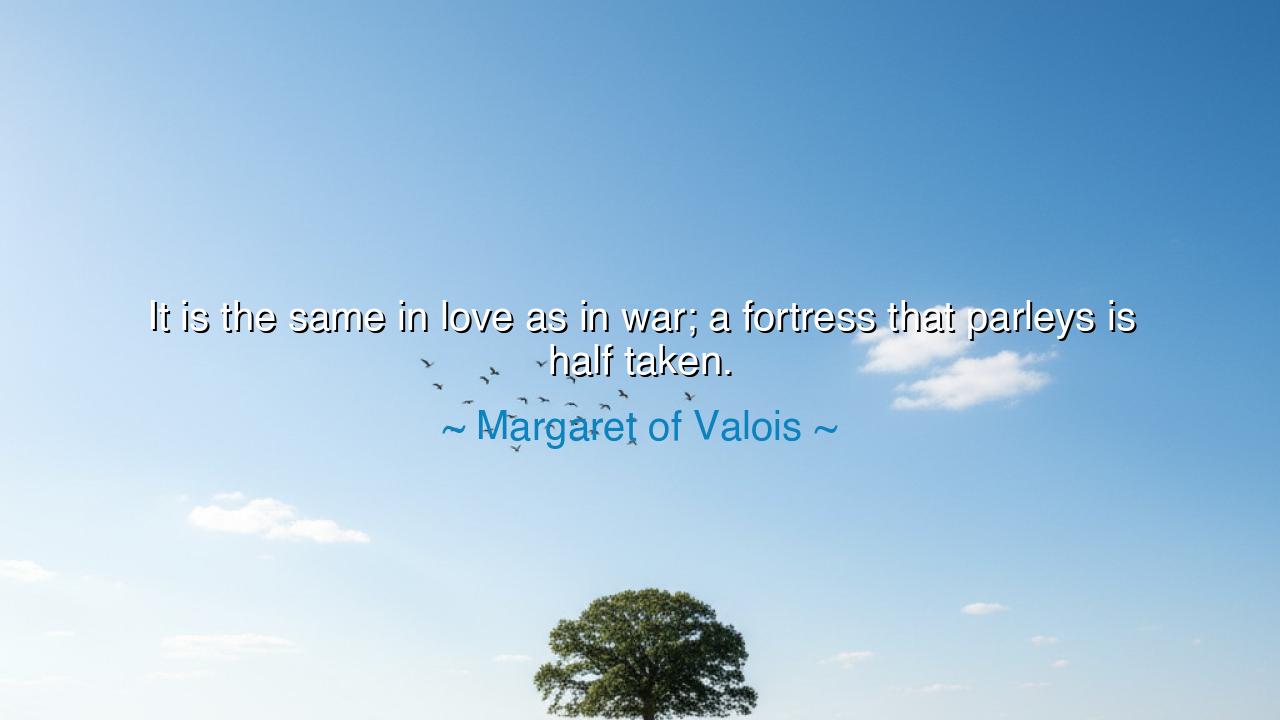
It is the same in love as in war; a fortress that parleys is






The words of Margaret of Valois, queen and chronicler of a turbulent age, strike us with piercing clarity: “It is the same in love as in war; a fortress that parleys is half taken.” In this utterance, the queen reveals a timeless truth, wrapped in the imagery of battle and conquest, yet directed at the tender mysteries of the human heart. She shows us that when a citadel begins to bargain, its walls are already weakened; when a heart begins to yield, its surrender is near.
In war, a fortress that agrees to negotiate exposes its fear, its hunger, its exhaustion. The soldiers upon its walls may still bear arms, but their spirit wavers, and the enemy knows the breach is not far off. So too in love: when one begins to entertain the approach of affection, even while protesting resistance, the gate of the heart is already ajar. The suitor who is received at all has already overcome the first barrier. Thus Margaret, with the wisdom of a woman who lived amid intrigue and passion, reminds us that the struggle of affection and desire mirrors the clash of arms.
This truth is seen in the story of her own age. Recall the city of Rouen, during the French Wars of Religion. Besieged by royal forces, the Huguenots within sought terms, and in their parley betrayed their weakness. The walls had not yet fallen, but their fate was sealed; the enemy knew the city’s spirit was broken. In love as in war, once the spirit falters, the body soon follows. Just so, the lover who once swore indifference, yet allows himself to linger in conversation, is already wounded, though he may not yet confess it.
Yet let us not misunderstand the queen’s counsel. This is no cold lesson of cynicism, but a recognition of the power of surrender. For while the fortress that bargains in war may be doomed, the heart that yields in love may be blessed. What seems defeat may, in truth, be victory, for love thrives not in impregnable walls, but in trust, in openness, in the courage to risk vulnerability. Margaret’s words remind us of the fine line between ruin and salvation, depending on the field of struggle.
From this teaching, we learn a double lesson. In matters of war—whether of nations, ambitions, or the struggles of daily life—beware of yielding too quickly, for to parley without strength is to invite defeat. Hold fast, preserve resolve, and let no adversary sense your weakness until you are prepared to triumph. But in matters of love, understand that to parley is to open the door, to let the other see within, and that such yielding may lead not to loss, but to union. Here the surrender of pride becomes the beginning of joy.
Therefore, children of wisdom, discern carefully the field upon which you stand. When confronted by enemies of truth, injustice, or despair, be a fortress unyielding, let no parley weaken your cause. But when approached by those who come in affection, in kindness, and in honesty, do not fear to lower the bridge, for sometimes the half-surrender of the heart is the first step toward its greatest fulfillment.
The practical teaching is clear: in your dealings with life, know when to guard and when to yield. Do not compromise with falsehood, but do not harden your heart against genuine love. Speak with courage when justice is at stake, yet do not be so proud that you miss the blessings of tenderness. For as Margaret of Valois spoke in her age of blood and intrigue, so we may say in ours: the fortress that parleys is half taken—but in love, that may be its greatest victory.






QADo Quynh Anh
The idea that a fortress that parleys is half taken suggests that indecision or weakness can lead to being overpowered, whether in battle or in love. But does that mean that open communication and vulnerability are always a risk? Is there a way to be strong in love without becoming closed off or overly defensive? How can we show strength without making ourselves emotionally unavailable?
UGUser Google
I find this comparison between love and war intriguing, but it raises an important question about the nature of communication in relationships. Is negotiating or compromising in love really a sign of weakness? Or is it sometimes essential to prevent conflict from escalating? How do we determine when to stand firm and when to allow vulnerability in order to maintain a balanced relationship?
MNMinh Ngoc
This quote speaks to the importance of strength and boundaries in both love and war. I wonder, though, how much of that is healthy for relationships? Is it always necessary to approach love as a conquest, or can it be more about partnership and mutual respect? What happens when one party becomes too defensive, or too hesitant to open up? How does this affect the dynamics of a relationship?
NTNguyet Tran
Margaret of Valois’ comparison of love to war is quite striking. It suggests that vulnerability or hesitation in either situation can lead to loss of control. But does this mean that we should approach love or relationships with a constant guard up, or is it more about maintaining strength and resolve without becoming too rigid? How do we balance openness with protecting ourselves from being 'half taken'?